I'm trying to switch to the ST HAL libraries and can't seem to get the PWM to work. Compiles fine, just doesn't start.
In my main() I call the Timer initialization function:
/* TIM3 init function */
void MX_TIM3_Init(void)
{
TIM_MasterConfigTypeDef sMasterConfig;
TIM_OC_InitTypeDef sConfigOC;
htim3.Instance = TIM3;
htim3.Init.Prescaler = 0;
htim3.Init.CounterMode = TIM_COUNTERMODE_UP;
htim3.Init.Period = 1300;
htim3.Init.ClockDivision = TIM_CLOCKDIVISION_DIV1;
HAL_TIM_PWM_Init(&htim3);
sMasterConfig.MasterOutputTrigger = TIM_TRGO_RESET;
sMasterConfig.MasterSlaveMode = TIM_MASTERSLAVEMODE_DISABLE;
HAL_TIMEx_MasterConfigSynchronization(&htim3, &sMasterConfig);
sConfigOC.OCMode = TIM_OCMODE_PWM1;
sConfigOC.OCIdleState = TIM_OCIDLESTATE_SET;
sConfigOC.Pulse = 650;
sConfigOC.OCPolarity = TIM_OCPOLARITY_HIGH;
sConfigOC.OCFastMode = TIM_OCFAST_ENABLE;
HAL_TIM_PWM_ConfigChannel(&htim3, &sConfigOC, TIM_CHANNEL_1);
HAL_TIM_PWM_ConfigChannel(&htim3, &sConfigOC, TIM_CHANNEL_2);
HAL_TIM_PWM_ConfigChannel(&htim3, &sConfigOC, TIM_CHANNEL_3);
HAL_TIM_PWM_ConfigChannel(&htim3, &sConfigOC, TIM_CHANNEL_4);
HAL_TIM_PWM_MspInit(&htim3);
}
The GPIO is initialized in the HAL_TIM_PWM_MspInit() function:
void HAL_TIM_PWM_MspInit(TIM_HandleTypeDef* htim_pwm)
{
GPIO_InitTypeDef GPIO_InitStruct;
if(htim_pwm->Instance==TIM3)
{
/* Peripheral clock enable */
__TIM3_CLK_ENABLE();
/**TIM3 GPIO Configuration
PC9 ------> TIM3_CH4
PC8 ------> TIM3_CH3
PC7 ------> TIM3_CH2
PC6 ------> TIM3_CH1
*/
GPIO_InitStruct.Pin = GPIO_PIN_9|GPIO_PIN_8|GPIO_PIN_7|GPIO_PIN_6;
GPIO_InitStruct.Mode = GPIO_MODE_AF_PP;
GPIO_InitStruct.Pull = GPIO_NOPULL;
GPIO_InitStruct.Speed = GPIO_SPEED_HIGH;
GPIO_InitStruct.Alternate = GPIO_AF2_TIM3;
HAL_GPIO_Init(GPIOC, &GPIO_InitStruct);
}
}
finally my main() looks like this: (I'm calling SystemInit() from main because I'm using STCube generated files with coocox coide)
int main(void)
{
SystemInit() ;
/* Reset of all peripherals, Initializes the Flash interface and the Systick. */
HAL_Init();
/* Configure the system clock */
SystemClock_Config();
/* Initialize all configured peripherals */
MX_TIM3_Init();
MX_GPIO_Init();
MX_LWIP_Init();
while (1)
{
}
}
